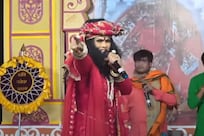DUBAI // Ram Kripal rued forgetting his handkerchief. An Indian pipe-fitter, he had been in such a hurry to get to the auditions for Camp ka Champ, the labour camp talent show, that he forgot to bring it with him. "I am new to this area so I had to wait for a friend to pick me up. He picked me up all right, but with his legs," he joked. "We walked all the way here. I half-ran all the way." And so by the time he reached the end of his performance - two slow songs, followed by a rousing singalong of a hit by Daler Mehndi, a Punjabi folk singer - his curly hair was slick with perspiration and he had given up even trying to mop the sweat off his face with his sleeves. But the judges seemed impressed; one even sang along. He was just one of the hundreds of labourers who gathered yesterday at Khansaheb camp in Jebel Ali to cheer on their fellow contestants as they sang in languages including Hindi, Tamil, Malayalam, Nepali and Bengali.
"They are shy guys but they like to be appreciated," said Rupa Vinod, one of the organisers. "This is a good way for them to interact with each other and they also enjoy the attention." "Camp ka Champ" - "Champ of the Camp" - is based on the Indian musical game antakshari, which is often played at weddings and celebrations. As well as singing, teams compete to start a song with the last letter of the lyrics from the previous song. They also have to identify Bollywood actors and sing songs from their films, as well as recognise dance clips from films and then sing the respective songs. So far, seven rounds of auditions have been held at various camps.
"We are looking for both kinds of contestants," said Ms Vinod. "Ones who have a good grasp of Bollywood and music and ones who sing well." Himal Giri, from Nepal, was clearly impatient to get to his job in Khansaheb's safety department, repeatedly looking at his watch as he waited for his turn to perform. Although he has no formal musical training, he made the finals of last year's contest - "but didn't have the luck I needed".
Dressed in neat khaki trousers and a light green shirt, he was a crowd favourite again this year, and was optimistic that the judges, too, would appreciate his rendition of three Bollywood favourites from the 1970s and 1980s. "Hopefully this year, it will be different," he said. While some of them shone, others were visibly nervous, with shaky voices and shaky microphones. While some were cheered on raucously for obvious camp favourites - usually Bollywood ballads - others stunned the audience with their vocal prowess.
Paresh Patel, an air-conditioning mechanic, was a first-time participant, and yet had an air of confidence that many of his rivals lacked. "Last year I was in Al Ain but after my transfer this year, I have been waiting all year to sing in front of these judges," he said. And well he might; the 25-year-old holds a diploma in vocal music and has trained in Indian classical music. Not only that, he is used to singing in public at events such as Navratri, an autumn festival in his native Gujarat.
Meanwhile, Surendra Yadav from Nepal had to tuck away his nerves to sing in public. He had learnt to sing from village elders, and had dabbled in theatre in his village. "They asked me to join the local theatre in the nearest town," he said. "But I was too young. And too shy." In the finals of the contest, now in its third year, teams from different labour camps will face each other. The men from Khansaheb were clearly hoping to defend their title from last year, when prizes included televisions, DVD players, stereos and cash remittances.
But for now, they must wait: the winners of yesterday's audition will not be revealed for another week, and then each camp will hold another round to decide who will face the teams from other camps. Shobana Chandramohan, one of the three judges and a disc jockey with Radio Spice, a station in Dubai, and a lead singer with the Malhaar Orchestra, ended the show by singing hits from the Oscar-winning soundtrack of Slumdog Millionaire. "We are trying to locate people with reasonable singing quality," she said. "We don't want them to go up there on stage and have the audience cover their ears.
"Language is not an issue; if they are good, we will give them a chance, no doubt about it. "We make them into heroes." sbhattacharya@thenational.ae





